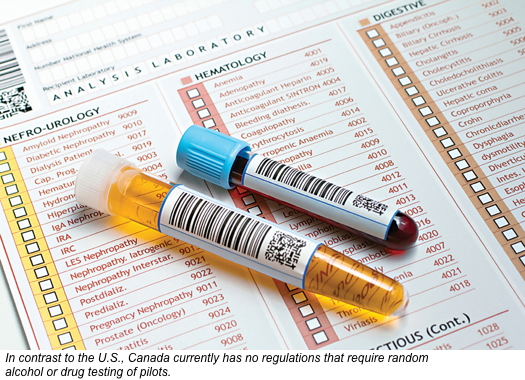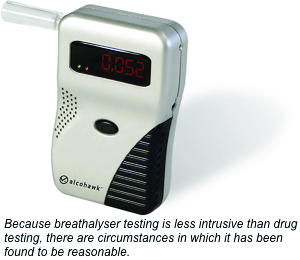In October of 2011, a Cessna Caravan on a VFR flight plan crashed in low visibility between Yellowknife, NWT, and the community of Lutsel K’e, NWT, on Great Slave Lake. The pilot and one passenger were fatally injured; the other two passengers were seriously injured.
When the Transportation Safety Board (TSB) report was released on March 20, 2013, one of the key Findings as to causes and contributing factors was:
The concentrations of cannabinoids [in the pilot’s body] were sufficient to have caused impairment in pilot performance and decision-making on the accident flight.
In response to this finding, the air operator revised its existing drug and alcohol policy to include random testing of employees in safety-sensitive positions.
On the surface, implementing random drug and alcohol testing for employees in safety-sensitive positions may seem like a logical and prudent action to prevent a similar accident from occurring again. However, Canada’s courts, arbitrators and tribunals have not always agreed that this is an acceptable practice.
Random Testing in Canada
As outlined in the TSB report, there currently are no regulations in Canada that require random alcohol or drug testing of pilots. This is opposite from the United States where, pursuant to the Department of Transportation’s rule 49 CFR Part 40, operators are required to conduct random drug and alcohol testing on employees in safety specific roles.
In Canada, as stated by a New Brunswick Court of Appeal judge, the scope of legal issues that arise in the context of an employer’s unilateral adoption of a drug and alcohol policy is indeed broad. Courts have ruled that drug and alcohol dependencies are disabilities which may be protected under the Canadian Human Rights Act. Therefore, a policy implementing random drug and alcohol testing is likely to be found to be discriminatory and unenforceable, unless it can be justified as a bona fide occupational requirement, which requires demonstrating that the policy:
1. was adopted for a purpose rationally connected to the performance of the job;
2. was adopted in good faith to achieve a legitimate, work-related purpose; and
3. is reasonably necessary to achieve that legitimate, work-related purpose (Reasonably necessary has been interpreted to mean the policy represents the least discriminatory way to achieve the employer’s goal).
In a unionized environment, a random testing policy can be challenged as an unreasonable intrusion on an employee’s privacy. Such policies have generally been found to be unreasonable if there is a less intrusive way to achieve the employer’s goal.
Random Drug Testing v. Random Alcohol Testing
Although drug and alcohol policies are often combined, there is a distinct difference between the way courts have treated random breathalyser tests and random drug tests. This is so for three reasons: (1) a breathalyser test is less intrusive than drug testing; (2) unlike alcohol testing, drug testing cannot measure present impairment (a positive test simply means that the employee has taken drugs in the past and may not be impaired at the moment); and (3) breathalyser results are instantaneous, whereas drug testing must be performed in a lab, so there is a delay in getting results.
For these reasons, there have been circumstances where random alcohol testing has been found to be reasonable and a bona fide occupational requirement. However, with the exception of cross-border truck drivers, random drug testing has yet to be upheld. Notably, the argument that random testing might act as a deterrent against employees using drugs generally has not been accepted as a sufficient reason to justify random drug testing.
Safety-Sensitive Position
A safety-sensitive position is defined as one in which incapacity due to drug or alcohol impairment could result in direct and significant risk of injury to the employee, others or the environment. Whether a job is considered safety-sensitive is viewed within the context of the industry, the particular workplace and an employee’s involvement in a high risk operation. Unquestionably, pilots and maintenance personnel would fall into this category. Other positions such as dispatchers or ground handlers may be considered safety-sensitive, though each situation would have to be determined from the facts.
Should Operators Risk Testing?
Previous decisions of the Canadian Human Rights Tribunal have found that for-cause and post-incident drug and alcohol testing are generally acceptable. For example, if a pilot’s actions reasonably led an employer to suspect that he or she may be impaired, a drug or alcohol test may be an acceptable practice in the circumstances. However, the following are not acceptable practices:
¢ Pre-employment drug testing;
¢ Pre-employment alcohol testing;
¢ Random drug testing; and
¢ Random alcohol testing of employees in non-safety-sensitive positions.
Even if an operator were able to justify a random testing policy, the operator would still be required to accommodate employees who test positive, to the point of undue hardship.
Despite the consistent refusal to uphold random drug testing, the law is far from settled. Irving Pulp and Paper in New Brunswick is headed to the Supreme Court to defend random alcohol testing of employees at its mill. Suncor in Alberta attempted to introduce random drug and alcohol testing for oil sands employees last fall, but their union successfully applied for an injunction to stop all testing pending arbitration. The direction in which the arbitration will evolve is currently unpredictable.
Previous cases have noted there are certain industries that are so highly safety sensitive as to justify a high degree of caution, including firm and forceful steps to ensure a substance free workplace. It is likely that air operators could justify a random alcohol testing policy, and conceivable that a random drug testing policy might also be justified if challenged.
In terms of evaluating the risk that a drug and alcohol policy will be challenged, unless the air operator is unionized, an employee with a drug or alcohol dependency would have to make a human rights complaint and navigate the human rights process at their own expense. That employee would also run the risk of their case becoming public.
Implementing a Drug and Alcohol Policy
Drug and alcohol use in the workplace is a complex issue without easy solutions. A one-size-fits-all solution is not the answer. When implementing policies to prevent impairment from drugs or alcohol, operators should ensure that it is a policy that specifically addresses the needs and concerns of their specific operation. Any policy should also allow flexibility for individualized accommodation, and reference access to support, counselling and addiction assistance programs.
If the decision is made to implement a drug and alcohol testing policy, operators should work with an employment lawyer familiar with the human rights process to create a policy that is not only effective at increasing safety, but also has a greater chance of being accepted if challenged.
James Ball is a lawyer with Whitelaw Twining Law Corporation in Vancouver, B.C. His practice is litigation based and focuses on aviation and subrogation matters. Prior to practicing law, James flew fixed-wing medevac and charter aircraft in Canada’s north. He is the author of So, You Want to be a Pilot, Eh? A Guidebook for Canadian Pilot Training, published in 2007.
Michelle McCann is a labour and employment lawyer with Stewart McKelvey in Halifax, N.S. She represents employers before courts and tribunals, provides strategic advice and drafts labour agreements and workplace polices. Read more labour and employment wisdom from Michelle and her colleagues at http://www.stewartmckelveyblogs.com/HRLaw/.



